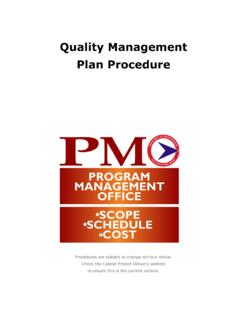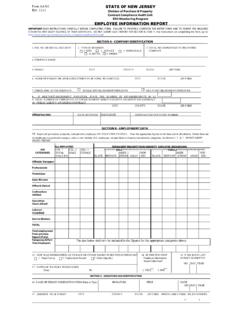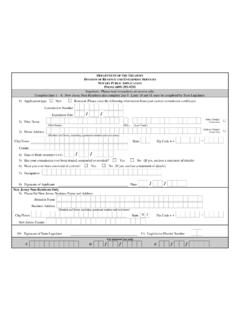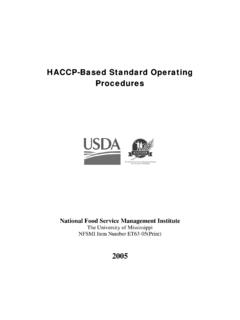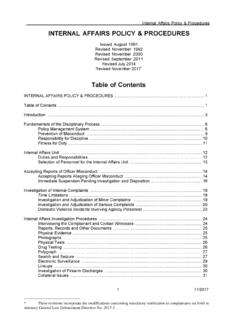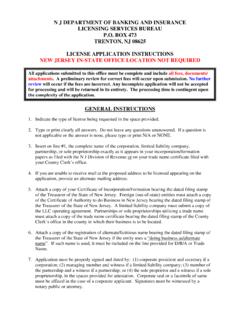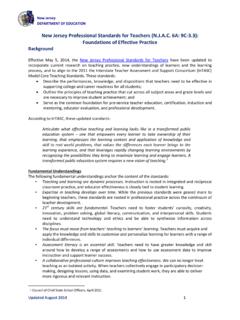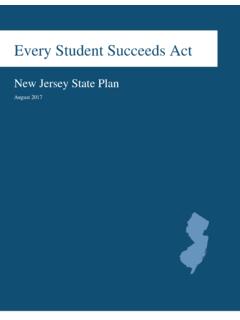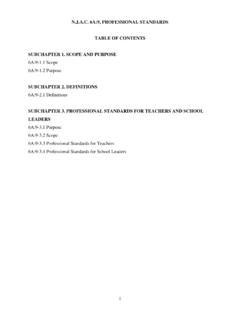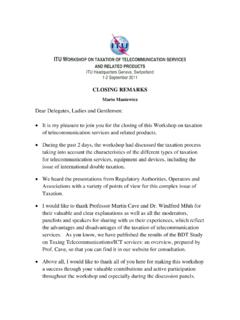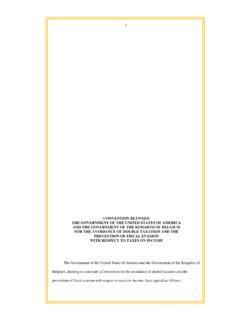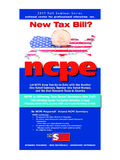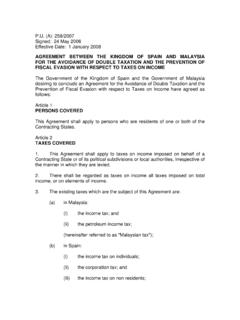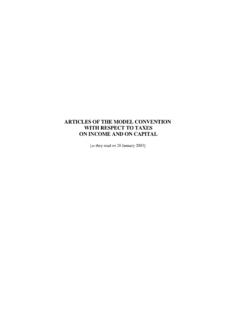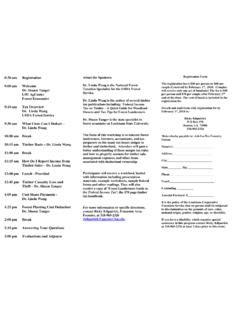Transcription of 2018 Form NJ-1040-ES ES 1
1 -ES12018 form NJ-1040-ESGeneral InformationEstimated tax means the amount that you estimate to be your In-come Tax for the year, after subtracting withholdings and other credits. If you do not pay your tax through withholdings, or if you do not have enough tax withheld, you must make estimated tax payments. You can avoid making these payments by asking your employer to withhold more tax from your wages. To do this, complete form NJ-W4 and give it to your employer. If you have pension income, file form NJ-W-4P with the payer of the pension to have tax withheld. For more information, see Tax Topic Bulletin GIT-8, Estimating Income : Estimated tax payments are not payments for out-standing tax liabilities. For information on starting a payment plan, visit Must FileWhether you are a resident or a nonresident, you are required to make estimated tax payments if you estimate that you will owe more than $400.
2 This also is true for certain estates and trusts. Consider the following when determining whether you are required to make estimated tax Income Filing Threshold. You are not required to file a New Jersey Income Tax return or pay tax if your gross in-come for the entire year is $20,000 or less (filing status married/civil union couple, filing joint return or head of household or qualifying widow(er)/surviving civil union partner), or $10,000 or less (estates and trusts, or individ uals with filing status single or married/civil union partner, filing separate return).Retirement Income Exclusion. You may be able to exclude up to $60,000 (filing status married/civil union couple, filing joint return), $45,000 (filing status single, head of household, or qualifying widow(er)/surviving civil union partner), or $30,000 (filing status married/civil union partner, filing separate return) of your taxable pension and other income.
3 When to FileYour first installment must be submitted on or before April 17, 2018, for calendar year filers or by the date specified in these instructions for Fiscal Year Taxpayers or Farmers or Changes in Tax Rate, Income, Exemptions, etc. If you are paying your estimated tax in four equal installments, additional payments must be made on or before June 15, 2018, September 17, 2018, and January 15, 2019. Where to Mail Your Estimated Payment Mail form NJ-1040-ES along with your check or money order to: State of New Jersey, Division of Taxation, Revenue Process-ing Center, PO Box 222, Trenton NJ 08646-0222. Write your Social Security number on your check. If you are filing jointly, include both of your Social Security numbers on all the documents you submit. Fiduciaries must include the fed-eral employer identification number of the estate or to Calculate Your Estimated TaxDetermine your expected income, then subtract your exemp-tions and deductions to arrive at your expected taxable income.
4 Apply the appropri ate tax rate to your expected taxable in-come. Subtract total anticipated credits and withholdings to arrive at your estimated tax. Use the estimated tax worksheet on page 3 as a guide for this calculation. See the instructions for the NJ-1040, NJ-1040NR, or NJ-1041 for more details on income, exemptions, deductions, and may be able to claim the following exemptions: Taxpayer (and either spouse/civil union partner, if filing jointly, or domestic partner) $1,000 each; Taxpayer (and spouse/civil union partner if filing jointly) who is 65 or older an additional $1,000 each; Taxpayer (and spouse/civil union partner if filing jointly) who is blind or disabled an additional $1,000 each; Taxpayer (and spouse/civil union partner if filing jointly) who is a veteran honorably discharged or released from active duty in the Armed Forces an additional $3,000 each.
5 Each dependent who qualifies as your dependent for federal income tax purposes $1,500 per dependent; Each dependent under age 22 who is attending an accredited institution of higher education full time an additional $1,000 per can deduct the following: Medical expenses in excess of 2% ( ) of gross income, qualified Archer medical savings account (MSA) contribu-tions, and health insurance costs of the self-employed; Alimony and separate maintenance payments, subject to certain limitations; Qualified conservation contributions; Health Enterprise Zone deduction; Property Tax Deduction or Credit (claim only one); Alternative business calculation CreditsIf you meet the eligibility requirements, you can claim: Property Tax Credit or Deduction (claim only one), New Jersey Earned Income Tax Credit, and Sheltered Workshop Tax Credit.
6 See the instruction booklet for the Income Tax return that you file for information on how to estimate the amount of your credit(s). Fiscal Year TaxpayersFiscal year filers must estimate their tax for the period covered by their fiscal year, and change the payment due dates to correspond with the 15th day of the fourth, sixth, and ninth month of their fiscal year, and the first month after the end of their fiscal year. When any date falls on a Saturday, Sunday, or legal holi day, substitute the next regular of Estimated TaxYou can pay your estimated tax in full by the due date of the first installment or in four equal installments. Estimated pay -ments can be made by:22018 form NJ-1040-ESCheck or Money Order, payable to State of New Jersey TGI. Write your Social Security number (federal employer identification number for estates or trusts) on your payment and enclose it with the completed voucher for the Check (e-check), online ( ).
7 If you do not have internet access, you can pay by e-check by con-tacting the Division s Customer Service Center (609-292-6400) or by visiting a Regional Information Center (see page 4). Do not send in a voucher when paying by e-check. You need your Social Security number and date of birth to make a payment. Estates and trusts need their federal employer identification number and either the date of the decedent s death or the date the trust was created. E-check payments made using an account that is funded from a financial institution outside the United States will not be accepted. E-check payments of estimated tax can be scheduled in advance. Credit Card, online ( ) or by phone (1-888-673-7694) using a Visa, American Express, Master- Card, or Discover card. Credit card payments also can be made by contacting the Division s Customer Service Center (609-292-6400) or by visiting a Regional Information Center (see page 4).
8 Fees apply when you pay by credit card. The fee is added to your actual tax payment. Do not send in a voucher when paying by credit in Tax Rate, Income, Exemptions, a change occurs, you may be required to make an estimated payment even if you did not need to make payments earlier in the year. Calendar year filers must file by: June 15, 2018 if changes occur after April 1 and before June 2; September 17, 2018 if changes occur after June 1 and before September 2; January 15, 2019 if changes occur after September the estimated tax in equal installments on the remaining payment do not need to submit a January 15, 2019, estimated pay-ment as long as you file your 2018 Income Tax return by Febru-ary 15, 2019, and pay the entire balance due. FarmersIf at least two-thirds of your total estimated income for the tax year is from farming (including oyster farming), you can submit your estimated tax payments at any time on or before Janu-ary 15, 2019.
9 In this case, the estimated tax must be paid in full. If you operate on a fiscal year basis, file by the 15th day of the first month after the end of your fiscal year. Amended Estimated PaymentsIf the amount of your estimated tax changes, any remaining installments must be adjusted to reflect the change. Use the Amended Computation Schedule on page 4 to determine the amount of your remaining installments. Failure to Pay Estimated Tax If an installment is filed after the due date, it does not affect the due date of the remaining installments. If you fail to pay all or any part of your required estimated tax, underpayment of estimated tax occurs. Interest is added to the underpayment amount for that period (see Interest below). The estate of a tax-payer who dies during the tax year may be required to start (or continue) filing estimated tax NJ-2210If you fail to make all required estimated tax payments, com-plete form NJ-2210, Underpayment of Estimated Tax by Individuals, Estates or Trusts, to determine if interest is due and if so, to cal culate the amount.
10 InterestInterest will be assessed at the prime rate plus 3%, compounded annually. At the end of each calendar year, any tax and interest that are still unpaid will become part of the balance on which interest is the Estimated Tax Payment Vouchera. Complete the worksheet to calculate your estimated Enter your name, address, and Social Security number on the voucher (if not preprinted). If you are filing jointly, include the name and Social Security numbers for both of you in the same order the names are listed on your New Jersey Income Tax return. Estates and trusts enter the federal employer identification : Print your numbers as follows:c. Check the appropriate box to indicate the return for which payment is being made: Resident ( form NJ-1040), Nonresident ( form NJ-1040NR or NJ-1080C), or Fiduciary ( form NJ-1041).
